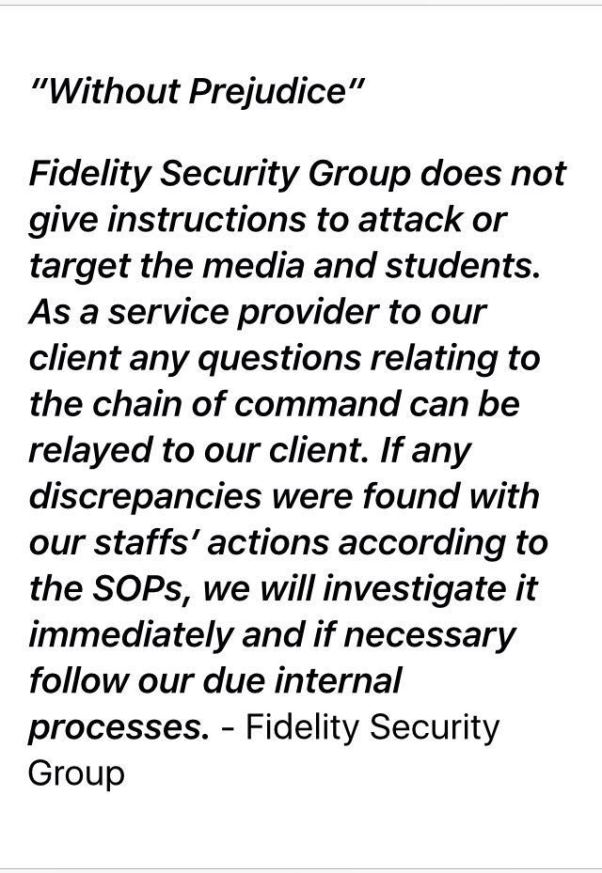Questions have been raised about the accountability of private security guards employed on university campuses, following scenes of violence involving private security at the University of Johannesburg (UJ) and Wits University during the students’ protest against the cost of tuition.
On Tuesday, 4 October, private security once more hurled rocks back at students at the piazza outside Great Hall at Wits, in a repeat of scenes just two weeks ago. And students say it is private security in particular who aggravate protest situations with violent interventions.
According to students who were on the piazza at Wits during the first confrontation with private security in September, private security were standing in formation along the pillars of the Great Hall, and refused to move to allow students into the building.
“They didn’t want to move so we started pushing … They banded their shields together and pushed so hard some people fell down the steps. I saw a black woman rushing out of the crowd with her head bleeding, and apparently about 13 people were injured,†said Khalil Moses.
“We broke those stone bins. We kept banging them against the ground and we broke them and picked up the stones and started throwing stones, and it got really hectic when they started throwing back. And they were aiming, you could see, they would watch and see who was throwing the stones and then walk down the steps and then aim at them. So a lot of people got injured in that.â€
Students say calm was restored only once police intervened.
Asked on Tuesday whether private security had been there to “beef up†police, Wits spokesperson Shirona Patel told eNCA that private security could not be seen to be contributing to the job of the police. “They are here to protect our property and the lives of students and staff who want to continue working,†she said.
The conduct of private security personnel has however been particularly inflammatory in protest situations at the University of Johannesburg.
At UJ last week, students, lecturers and journalists said that private security guards had used pepper spray on them indiscriminately. The university itself admitted that private security had overstepped the bounds of their official functions.
“We’ve had two occasions now where private security has simply gone outside of the responsibilities that we have agreed to with them,†UJ vice chancellor Ihron Rensburg said.
Rensburg said it was the duty of private security guards, together with the normal university protection services, to provide “cover†at university security gates and to prevent access to those gates.
“Their responsibility is to make no contact with students. Their responsibility is to work together with the university protection services in the first instance, to secure gates. So where there is a risk of students storming through the gate and students, with non-students of the university, storming through the gates.
Rensburg also said that it was unacceptable for private security to throw rocks back at students.
“Yes, rocks were thrown at them but there is absolutely no basis, absolutely no reason in our view, in my view, for them to pick up rocks and throw it back at students.†he said.
“That is not what we expect of these private security. And that is non-negotiable. At the same time, indiscriminately, pepper spray was used … And I’m deeply saddened that journalists were at the same time pepper sprayed. I’m told not just by accident but, pepper-sprayed.â€
Fidelity, the private security company in question, however denies that it gives instructions to attack or target the media or students.
Problems related to the use of private security companies on university campuses are neither new, nor restricted to Johannesburg-based universities.
Last month, private security guards reportedly raided a UKZN residence in Westville.
And in February, UKZN students who had joined a workers’ strike in solidarity with workers on campus, also complained about the presence of private security guards.
Days later, students clashed with private security guards, who they accused of opening fire on students with live ammunition. The university, however, denied the claim.
In May, students at the Vaal University of Technology protested against the use of the private Mafoko Security on campus, which they have accused of colluding with criminals.
Private security has become a feature of campus security but it’s unclear exactly how much these services cost the institutions.
In February, Wits University’s student paper Vuvuzela, filed a Promotion of Access to Information request, to find out how much the university was spending on private security.
The paper had noted an increase in the number of private security guards on campus – of anywhere between 10 and 200 additional guards – since October 2015. Student journalists established that Wits had spent about R2-million a month on additional security, since that time.
Onlookers have questioned the training and proficiency of private security in protest situations.
Dr Johan Burger, a researcher in the Governance, Crime and Justice Division of the Institute of Security Studies told the Daily Vox that in may cases, private security on campus is “the first line of defence†as there are simply too many universities for police to maintain a presence there and to police other events and protests at the same time.
“But of course, one could question the way in which they conduct themselves sometimes and you can ask all those relevant questions. Are they really qualified to perform crowd control?†he asked.
Burger says stricter regulation of the private security industry is urgently required. “Certainly, there needs to be much better control of the private security industry,†he said.

![[slider] uj-protest-private security at entrance to kingsway campus 28-september-2016-4](https://www.thedailyvox.co.za/wp-content/uploads/2016/10/UJ-protest-28-September-2016-4.jpeg)








